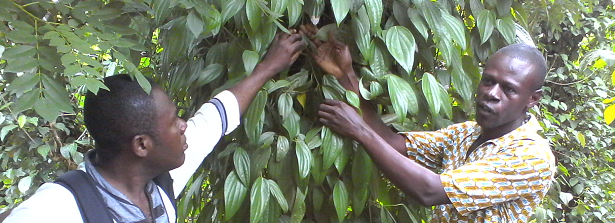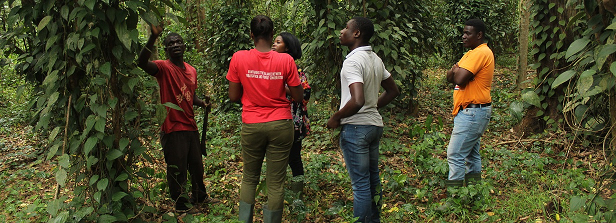Introducing non-timber forest products in reforestation schemes & tree-crop farms in Ghana (Treefarms)

Duration: 20 January 2016 – 19 January 2019. This project has been finalized.
Project information
Aim: Employing a gender-sensitive and stepwise collaborative learning approach, this project aims to integrate nutritious shade-tolerant non-timber forest products (NTFPs) (black pepper, grains of paradise and honey) in Ghana’s modified taungya (reforestation) system and off-reserve tree farms. The project aims to enhance food and income security for these farmers after canopy closure by examining and building capacity on how three previously introduced shade-tolerant non-timber forest products can be successfully harvested, processed and marketed.
The proposed duration allows integrating research and capacity development through the entire NTFP cycle (seedling production, cultivation/honey production, processing and marketing) and before project closure, all collaborative learning stages (inception/taking stock, joint implementation/co-creation of knowledge, dissemination/enhancing uptake) to be dealt with.
Objective: The overall objective of this project is to enhance food and income security of MTS farmers and tree farmers in off-reserve areas after canopy closure. Specific objective is to generate knowledge and build capacity that enables the integration and production of shade-tolerant NTFPs (black pepper, grains of paradise and honey) in on- and off-reserve tree farms and their successful processing and marketing.
Method: The project is organized in eight work packages (WPs); six addressing research questions and associated capacity building/collaborative learning; one for capacity building of MSc students affiliated to the partner organizations; and one for overall project coordination.
The project involves farmers, practitioners, policymakers, NGOs and value-chain actors in a stepwise collaborative learning approach including inception, joint implementation, and dissemination. Built on knowledge gaps identified by farmers and practitioners, this proposal contributes to the broader debate on landscape approaches that aim to integrally address food insecurity, deforestation, environmental degradation, and climate change.
Country: Ghana.
Dutch policy goals: Increased sustainable agricultural production; and More efficient markets.
Progress reports
Year 1: Benefits of Ghana’s gender-sensitive reforestation scheme that combines trees and food crops, the Modified Taungya System (MTS), are reduced after canopy closure. Farmers then lose interest in the scheme as food crops can no longer be grown. With a view to enhancing farmers’ food and income security, research and capacity building focuses on how three previously introduced shade-tolerant non-timber forest products can be successfully harvested, processed and marketed. The project involves farmers, practitioners, policymakers, NGOs and value-chain actors in a stepwise collaborative learning approach including inception, joint implementation, and dissemination. Built on knowledge gaps identified by farmers and practitioners, the project contributes to the broader debate on landscape approaches that aim to integrally address food insecurity, deforestation, environmental degradation, and climate change. Deliverables include insights into opportunities for improved production, processing and marketing and how continual learning can be institutionalised in farmer groups, communities of practice, and learning platforms.
Year 2: Benefits of Ghana’s gender-sensitive reforestation scheme, the Modified Taungya System (MTS), which combines trees and food crops are reduced after canopy closure. Farmers then lose interest in the scheme as food crops can no longer be grown. With a view to enhancing farmers’ food and income security, the project focuses on how three previously introduced shade-tolerant non-timber forest products (NTFPs)1 can be successfully harvested, processed and marketed. The project involves farmers, practitioners, policymakers, NGOs and value-chain actors in a stepwise knowledge co-creation approach including inception, joint implementation, and dissemination. Preliminary research results indicate that survival rate, growth, and yields of NTFPs vary much depend on the tree species used in the forest plantation or tree farm. Knowledge co-creation activities (multi-level learning platform, community of practice and cross-farm visits) have exposed farmers to potential local and regional markets for the NTFPs and building capacity in NTFP production and entrepreneurial skills.
Final report
Summary of the results: The modified Taungya System (MTS) is a landscape restoration and climate change mitigation strategy that combines trees with food crops, involving the Ghana Forestry Commission and smallholders. This project examined whether integrating shade-tolerant non-timber forest products (NTFPs) and food crops could enhance farmers’ benefits after canopy closure, when food crops can no longer be grown. It enhanced collaborative learning between farmers, practitioners, policymakers and researchers.
Beekeeping is already being rolled out. For black pepper and grains of paradise, production groups have been organised and empowered to overcome marketing challenges, while contacts have been established with interested companies. Preliminary results of a pilot with shade-tolerant food crops (ginger, cocoyam, wild yam) look promising for having a ready market and being part of farmers’ diet. NTFPs have positive results on tree density and wildfire risks.
Thanks to this project the MTS and introduction of shade-tolerant NTFPs and food crops is now a key element of Ghana’s Forest Plantation Strategy 2016-2040. The FC institutionalised the learning platform as a novel way of interacting with farmers and other stakeholders, giving greater value to farmers’ knowledge and experiences. Enabling an MPhil trajectory for seven staff of Ghanaian consortium partners ensured institutional strengthening and sustainable results.

